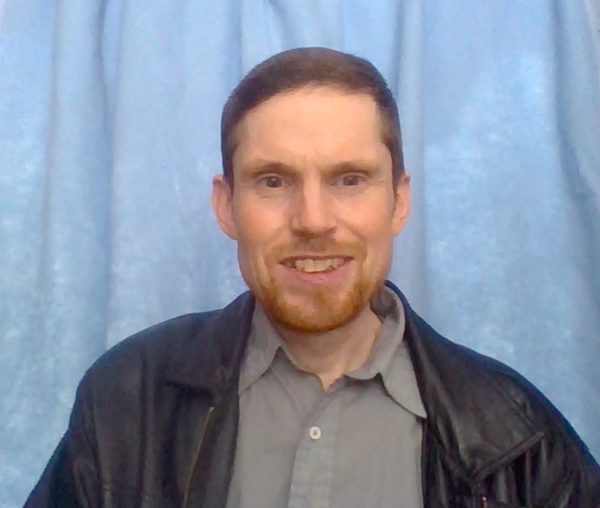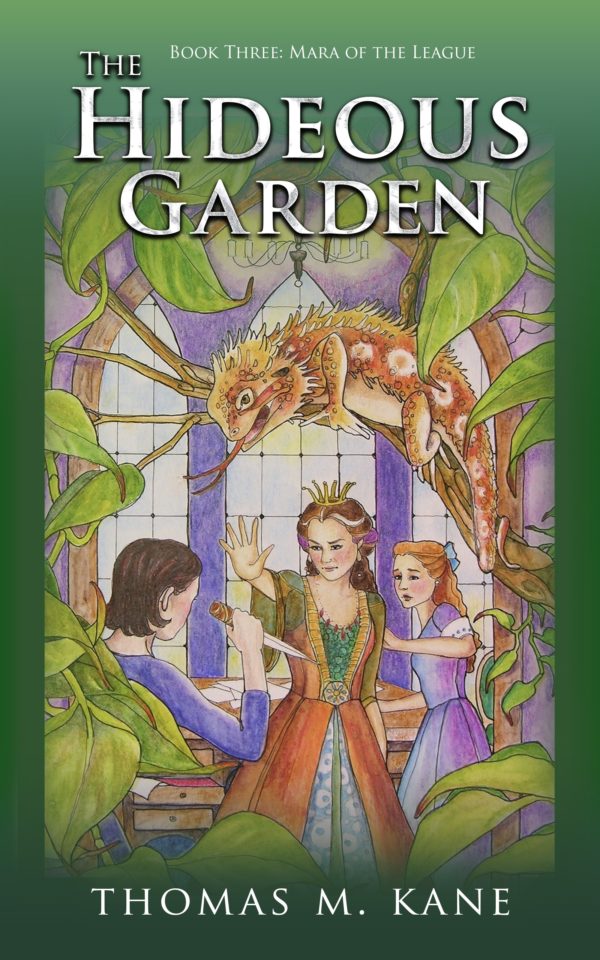Welcome to my weekly Author Spotlight. I’ve asked a bunch of my author friends to answer a set of interview questions, and to share their latest work.

Today, Thomas M. Kane – I grew up in the woods of Maine. When I first read Tolkien at age eleven, the forests and mountains of Middle Earth seemed like home. The Empire Strikes Back came out at about the same time, and snowy Hoth also looked pretty familiar. As a teenager, I discovered role-playing games, and by the time I finished college, I was publishing gaming supplements.
My gaming publications include GURPS Espionage, a Shadowrun adventure called Ivy and Chrome and a lot of Advanced Dungeons and Dragons material released in the days of TSR Incorporated. Atlas Games supported me in developing character and idea-driven adventure adventures for Ars Magica and Cyberpunk 2020. My Ars Magica supplement South of the Sunexplored medieval tales of the legendary southern hemisphere kingdom ruled by Prester John, and my Cyberpunk adventure Greenwar looked at the economic side of dark future corporate warfare.
Meanwhile on twentieth-century Earth, I went to graduate school. When a moderately well-known British professor in my field invited me to complete my PhD with him in England, I gratefully accepted. I went on to become a lecturer in international relations at Britain’s University of Hull. After eighteen years in that position, I returned to Maine and started writing novels. I recently released the third book in my Mara of the League series.
Thanks so much, Thomas, for joining me!
JSC: What’s the weirdest thing you’ve ever done in the name of research?
Thomas M. Kane: In graduate school in the 1990s, I took a class in which the professor gave each student a piece of paper printed with the name of a small, privately-owned corporation. The professor assigned us to learn as much as we could about those corporations’ ownership, operations, sources of income etc. Although the professor did not tell us this, I knew him well enough to know he suspected the corporations of being front companies for intelligence agencies. My corporation was a firm which brokered technology transfers between the US and Russia.
I called the company’s offices from a pay phone, identified myself as a student, and tried to get people to answer questions. Eventually I got through to someone who said, in a grim voice, that I was prying into things he couldn’t talk about. The truth is, I might have gotten a similar answer if I had called a company that made toothbrushes. However, I was kind of pleased with myself for eliciting that response.
JSC: What were your goals and intentions in “The Hideous Garden,”, and how well do you feel you achieved them?
TMK: This series follows my protagonist Mara’ from childhood to middle age. She is 47 in The Hideous Garden, and my goal is to show how her life has taken shape. After a tumultuous relationship in the previous book, she has settled into singledom. Her cover job as a censor allows her to afford laundry services, vegetarian food and a one-room apartment. Although she knows she will never achieve the same sort of lifestyle as her parents, she has come to appreciate the independence which her new situation offers her.
Meanwhile, Mara’s secret career as the head of her country’s intelligence services has allowed her to see how her world’s large-scale political situation is evolving. All Mara’s life, her country has engaged in a sort of cold war with a rival known as Waan. Mara becomes convinced that Waan is putting itself in a position to invade. My second goal with this book is to show readers how diplomatic and military strategy unfolds on a grand scale, and to make an exciting story out of it.
Beta readers and Amazon reviewers have noticed both the personal and the political themes in my book. They’ve also said kind things about how I handled them. So, I like to think I’ve achieved what I set out to do.
JSC: What inspired you to write this particular story? What were the challenges in bringing it to life?
TMK: I trace my inspiration for the Mara series back to early childhood, when my mother told me the story of Cassandra. My ideas for this book took shape when I was in graduate school learning how Germany rearmed in the 1930s. Not only was I interested in the military side of what happened, I was interested in the moral questions it raised. One generally assumes that war is wrong, but seems clear that France, Britain and the US should have stopped the Nazis sooner.
The biggest challenge in writing this story was that the process of making big political decisions isn’t always as exciting as the consequences. In a historically accurate novel about the build-up to World War Two, the characters would spend most of their time writing memos and going to meetings. Real life also tends to be complicated, and a historically accurate novel about this sort of subject would involve an excessive number of subplots. I addressed these issues by thinking carefully about what debates and what side issues were essential to the outcome, and focusing on the crucial ones. The Hideous Garden also features a spy plot which keeps the characters in physical danger.
JSC: What secondary character would you like to explore more? Tell me about him or her.
TMK: My MC Mara’s mother Abigail Bennet. At the beginning of Book One, Mara finds her mother harsh and judgmental. I don’t want to give away any spoilers, but as the story goes on and the Bennet family faces challenges, Abigail rises to the occasion. By the end of the first book, Mara sees her mother in a different way.
In later books, Mara grows up and moves away from home. Meanwhile, her mother reads for the bar, becomes a lawyer and successfully sues the organization responsible for carrying out witch-hunts. When I finish telling Mara’s story, I plan to write a stand-alone novel titled The People vs. Abigail Bennet. Mara’s mother is going to defend an unpopular client from charges of murder.
JSC: What’s your core motivation in this book?
TMK (Writing as my protagonist Mara): A direct answer is that I am protecting my country. It was plain to me that the lords of Waan were behind this winter’s attempt on our ruler’s life. I thought it equally plain that the attack was but an opening move in a more ambitious plot. Since then, I have been trying to find out what our Waanling enemies are planning and stop them before it is too late.
This, however, raises the deeper question of why I risk my life in such intrigues. The ruler I serve treats me as a nuisance. My friends would be horrified if they knew the things I have done. Moreover, my country does not always seem worth saving. Once, someone I care about challenged me to explain what made our realm any better than its foes.
I did not have a ready answer. Nevertheless, over the course of my life I have seen that despite my country’s injustices, it affords some space for happiness. Freedom grows like a beautiful weed in a hideous garden. I defend what is good in my country because if the garden is trampled, the weed also will perish.
JSC: If you had the opportunity to live one year of your life over again, which year would you choose, and why?
TMK: The year 2000. I had gotten my first professional job, I had gotten out of a bad relationship, the city I lived in was becoming a more pleasant place to live and I felt very free. On New Year’s Eve I bought a bottle of something strong, which was an unusual treat for me, and watched the millennium fireworks from the window of my third-story flat. When summer came, I set myself the goal of traveling along at least part of the Silk Road and ended up in Turkey. Once home, I became a regular at a new coffee shop and made a few friends there. Along the way I wrote my first novel and my second academic book.
JSC: What are some day jobs that you have held? If any of them impacted your writing, share an example.
TMK: I was a lecturer in international politics at Britain’s University of Hull. Since a lot of my fiction deals with war, espionage and intrigue, the connection is obvious. Not only did I study the same topics I write novels about, I got to travel to a lot of interesting places and meet a lot of interesting people. I’ve observed armored warfare exercises at the US Army’s National Training Center, participated in wargames with officers of the British Navy and talked with the CIA officer who recruited the controversial defector Yuri Nosenko.
JSC: Describe yourself using an animal.
TMK: A chameleon. I need a heat source, and I’ve found that people who think I would make a good pet don’t really understand me.
JSC: What fictional speculative fiction character would you like to spend an evening with, and why?
TMK: Iroh, from Avatar: The Last Airbender. I like to think we value a lot of the same things in life.
JSC: What are you working on now?
TMK: Book Four of the Mara series, The Rending of the World. This is the one where war breaks out.
And now for Thomas’s latest book: The Hideous Garden:
Mara of the League
At eleven years old, Mara Bennet tries to save her family from a foreign invasion. When the knights who are supposed to be protecting her village arrest her favorite aunt for witchcraft, she learns things about politics that the grown-ups never meant to teach her. Mara of the League follows her life as she becomes ever more deeply involved in her country’s intrigues. Her deeds may ultimately prevent — or set off — a catastrophic war.
Book One:
The Witches of Crannock Dale
Book Two: The Rebels of Caer City
Book Three: The Hideous Garden
Excerpt
“Hm.” The Lion Gossip turned on his heel and looked up at the surgeons’ galleries. “You do not break as quickly as some. Indeed, if I did not know better, you might have been able to convince me you were innocent. Earlier, you claimed you were useful. I am beginning to believe you were right. Waan has uses for people who know how to keep secrets.”
Anita Rosita spoke emphatically. “Truly, sir, I wish only to serve. If I have . . . if you believe I have done wrong, give me the chance to make up for it.”
“I shall.” The Lion Gossip turned to gaze into Anita’s eyes again. “I have a few errands for you to run. They involve foreign travel. Your husband will miss you, but I shall tell him that you need to go abroad for your health. That will be the truth. Your health very much depends on your completing these errands successfully.”
“Oh, sir, I understand.”
“I hope you do.” The Gossip showed his teeth. “Because I am still concerned about this . . . infection your Caerish schoolfriends have passed on to you. Some illnesses run in families. One must be aggressive in treating them. I fear your son Makub may have inherited your sickness. But I am even more concerned about his children.”
Anita shook her head. She felt her smile widen and become desperate. “But they’re so small—they can’t—they have nothing to do with this—”
“To the contrary, my queen. If you do not follow instructions while you are abroad, you will find that this has everything to do with your grandchildren.”

